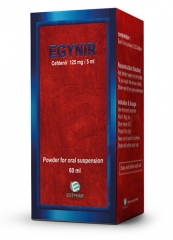CERVITAM
CORVAST 80
DAFREX
EGY DRONATE
EGYNIR
EGYURSO
FERROCAL
FINOFIB
GRAMOCEF
KOKAST 10 MG
LORAFAST
PEDICAL PLUS
RAMSOOM
VEDGE SUSPENSION
SELECTIVAL
OSTOVAL
TERVENTIN
TOTAVIT SUSPENSION
AMEBAZOLE
ARCA-ZINC
ARTHINEUR
COMBIFLOXIN
HELICURE
LODIPINE
UNOCRON 60
ZISROCIN
METHOCARBEX
ZISROCIN SUSPENSION
EGYNIR SUSPENSION
MODAZAR 100+25 MG
TOTAVIT TABLET
VEDGE TABLET
CORVAST 20
CORVAST 40
TORVAST 10
TORVAST 20
TORVAST 40
KOKAST 4 MG
UNOCRON 30
LEVOCITRONE
SHATOO
CITALOFAR
VARDARICT
ACPOPHAR
VANISH
IMMUNIPHAR
EGYNIR SUSPENSION


Composition
Action
Indications
Adults and Adolescents
Pediatric Patients
Dosage and administration
Contraindications
Warnings
Precautions
Drug interactions
Side effects
Overdosage
Storage
Presentation
Each 5 ml contains after reconstitution Cefdinir 125mg



